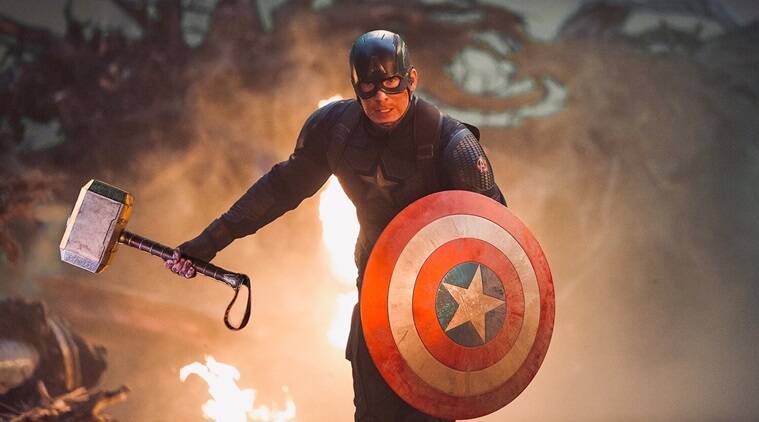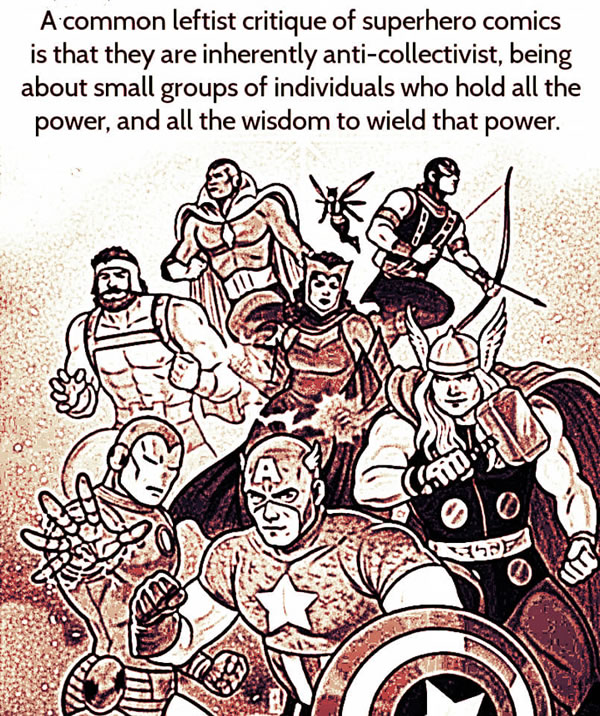Happy Independence Day, superhero-style!


Although the concept of the superhero is as old as the Epic of Gilgamesh, superheroes as we know them today are a product of American history. DC’s Superman and Wonder Woman fought in World War II, as did Marvel’s Captain America, Bucky, the original Human Torch, and Namor, a.k.a. the Sub-Mariner.
(Don’t worry if you’re not familiar with Namor just yet. Once upon a time, most people outside the world of comic book fandom would never have recognized the characters from Avengers: Endgame. I’m still blown away by the fact that Groot and Rocket Raccoon are pretty much household names these days.)
I think that superheroes represent the best of American ideals, and that one of the best representations of superheroes is this little essay that’s been around the internet for a number of years. I’m posting it here as my way of celebrating Independence Day. Enjoy!


A common leftist critique of superhero comics is that they are inherently anti-collectivist, being about small groups of individuals who hold all the power, and the wisdom to wield that power.
I don’t disagree with this reading. I don’t think it’s inaccurate. Superheroes are their own ruling class, the concept of the übermensch writ large.
But it’s a sterile reading. It examines superhero comics as a cold text, and ignores something that I believe in fundamental, especially to superhero storytelling: the way people engage with text. Not what it says, but how it is read.
The average comic reader doesn’t fantasize about being a civilian in a world of superheroes, they fantasize about being a superhero. One could charitably chalk this up to a lust for power, except for one fact…
The fantasy is almost always the act of helping people. Helping the vulnerable, with no reward promised in return.
Being a century into the genre, we’ve seen countless subversions and deconstructions of the story.
But at its core, the superhero myth is about using the gifts you’ve been given to enrich the people around you, never asking for payment, never advancing an ulterior motive.
We should (and do) spend time nitpicking these fantasies, examining their unintended consequences, their hypocrisies.
But it’s worth acknowledging that the most eduring childhood fantasy of the last hundred years hasn’t been to become rich. Superheroes come from every class (don’t let the MCU fool you).
The most enduring fantasy is to become powerful enough to take the weak under your own wing. To give, without needing to take.
So yes, the superhero myth, as a text, isn’t collectivist. But that’s not why we keep coming back to it.
That’s not why children read it.
We keep coming back to it to learn one simple lesson…
The best thing we can do with power IS GIVE IT AWAY.
Recent Posts
Sunday picdump for December 22, 2024
It’s not just another Sunday, but the Sunday leading up to Christmas! It’s that time…
A reminder for April Fools’ Day
Have a good April Fools’ Day tomorrow, but be mindful about your pranking.
How NOT to sell a computer
As I’ve written before, I sometimes browse Facebook Marketplace for nothing more than pure entertainment,…
Sunday picdump for March 23, 2025
Another Sunday, another “picdump!” Here are 250 memes, pictures, and cartoons floating around the internet…
Sunday picdump for March 16, 2025
Another Sunday, another “picdump!” Here are 200+ memes, pictures, and cartoons floating around the internet…
Sunday picdump for March 9, 2025
Another Sunday, another “picdump!” Here are 200+ memes, pictures, and cartoons floating around the internet…
View Comments
It may be a leftist critique, I don't know how common it is. I will point out that it is healthy to like something, and at the same time be aware of its shortcomings and be critical of those.
Most comic superheroes are super-leftists. Inhumanly so. If they were just "regular people with super powers", you would get dark fantasies where heroes assassinate other heroes and innocent people, like Watchmen, or You get "sucks to be them/I am a psychopath"-heroes like The Boys. The only way to make the story work is by making them inhumanely care about others and be idealistically moral.
If there is any doubt about where comic heroes lean ideologically, see who they fight. Lex Luthor. Magneto. Doctor Doom. Red Skull. Thanos...
We "leftists" might see some parts of comics as problematic, but the enemy of my enemy is my friend.
Don't forget that most of the modern superheros from DC and Marvel were created by American Jews and in the Jewish tradition. Stan Lee, Jack Kirby, Siegel and Shuster were all Jewish. A lot of Jewish philosophical ideas show up in their comic books, and as you point out, one of them is the importance of performing a mitzvah. At a Jewish funeral mourners each throw three shovels full of dirt into the grave. Burying the dead is considered a mitzvah, a favor that can never be repaid.
I always considered DC to be more New Testament. The hero is one and alone and often has to suffer for his or her power. Superman's original origin story, being saved from an exploding planet and adopted to live a new life on a new world was clearly influenced by the Moses story, and from Moses's Hebrew name we get the word messiah.
Marvel is more Old Testament where the powers vary and are rarely as broad as those in DC. Many people have those powers, Samson, Judith, David, Solomon, and they must deal with them in strength and in weakness. They are just people who are expected to use what they have given. Sometimes they succeed. Sometimes they fail.
Nice to find the original, tumblr almost ruined it by using to argue red hood isn't a fascistic cop